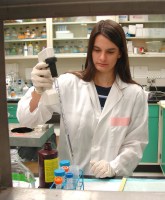|
MULTI-DISCIPLINARY RESEARCH TEAM
-
Through its
multi-disciplinary capabilities, NCTR is able to develop new
technologies and new assays to evaluate adverse toxicological
effects
-
NCTR scientists work
closely with scientists in academia, government, and industry to
solve problems leading to uncertainty in product development and
use
TYPES
OF RESEARCH STUDIES
-
Exposures that result
in cancer forming in laboratory animals
-
Toxicities that might
show up in the offspring of animals one or more generations
after the parents have been exposed
-
Exposures that result
in genetic mutations
-
Exposures that result
in deformities or other abnormalities in offspring
-
Identification of
genetic variants that make individuals more susceptible to
disease or the effects of chemical or drug exposures
-
Exposures to the
central nervous system that damage tissue, the functioning of
the nervous system, or behavior. (This work is closely
coordinated with those studying the effects of exposures of
drugs on children)
-
Toxicities to specific
organs such as liver and thyroid
-
Toxicities that alter
the way that organs or organ systems interact within the body
<Back
to NCTR Research Disciplines> |